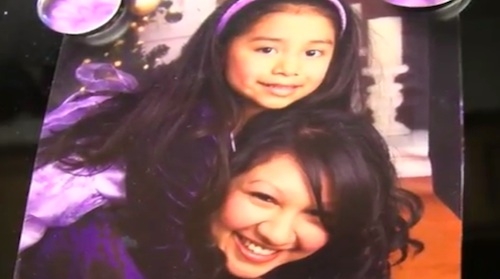Citizen Kids Suffer Trauma at Separation from Immig. Parents

 By Rocio Romero, El Nuevo Sol/New america Media
By Rocio Romero, El Nuevo Sol/New america Media
U.S.-born María Vasques was just six years old when her mother Edith Barrios kissed her goodbye. She told María that she was off to work, and she hurried out the door dragging a suitcase.
 María’s mother told her a white but enduring lie. That day, she abandoned the two bedroom apartment in Canoga Park to El Salvador, her mother’s native land, and didn’t come back for four years.
María’s mother told her a white but enduring lie. That day, she abandoned the two bedroom apartment in Canoga Park to El Salvador, her mother’s native land, and didn’t come back for four years.
“I didn’t understand (why she left),” twenty-five-year-old María says with tears running down her puffy cheek.
María’s mother, who was then undocumented, had fears of being deported so she left the country in 1994 with hopes that a family member would sponsor her.
Barrios left during a time when immigration tensions were high. California voters had approved Proposition 187, the “Save our State” Initiative. The law barred undocumented immigrants from the state’s public education system, health care and other social services.
But in 1999, Prop. 187 was challenged in a legal suit and was found unconstitutional by federal court.
Still, immigration policy continues to be a problem for thousands of U.S. children and their immigrant parents.
From July 1, 2010, to Sept. 31, 2012, almost 23 percent of all 204,810 deportations were issued to parents with citizen children, according to federal data searched and published by Colorlines Magazine a publication of the Applied Research Center, a think tank that promotes racial justice.
For María, the four years she spent without the presence of her mother were full of mental distress. She grew lonely, fearful and full of anxiety.
“Being home alone for four years was hard, real hard,” she says. “Most of the time it was just me and my dog.”
Experts agree this process can be severely traumatic and it could potentially damage a child’s mental growth.
These children start out by acting aggressively or they begin to isolate, says Tania Fallert, associate director for El Centro de Amistad, an organization committed to providing mental health services, case management, medication, recreational and education support to Latino children, adults, and families.
Fallart has worked closely with U.S.-citizen children who have been separated from their parents due to immigration policy.
“It can go to extremes, depending on the child’s personality,” Fallert says. “From anxiety, nightmares, getting up in the middle of the night and not be able to sleep, to lack of concentration and focus.
María chose to isolate herself. She didn’t speak much and she distanced herself from social activities in school. She felt this was the only way of expressing her anger after her mother had left her without giving her an explanation.
According to Fallert, this is the mistake that many undocumented parents make when they are deported or choose to leave the country. They tend not to talk about the situation they are in with their children. Children may easily develop psychological trauma simply because their parents don’t tell them the truth about the situation.
“We encourage parents to talk about it,” Fallert says. “Talking about it doesn’t make things worse; it actually brings things out and to the open.”
María’s mother was able to re-enter the country legally and was granted permanent residency in 1998.
Upon her mother’s return, the relationship between the two grew unstable and distant. Even after a few years, María confessed that she didn’t have a close relationship with her mother.
But their lives, along with their tumultuous relationship, completely changed when her mother announced her engagement to a man María didn’t know.
The then 14-year-old teenager didn’t know that her mother was dating anyone.
“I was really angry at first,” she says. “But towards the end, I was glad she was marrying a good person.”
Francisco Epolito was a devoted husband and stepfather. María remembers the various occasions the three sat around the dinner table to enjoy Epolito’s specialty Mexican dishes or when he would pick her up from school after a long day of work and take her to get her nails done.
A year later, the family was overwhelmed with joy when María’s mother gave birth to her second daughter, Francis Epolito.
With the birth of Francis, María was convinced that her stepfather would never abandon them.
“He was always there,” María explains with a delicate smile and tears running down her eyes.
Towards the end of 2007, her stepfather and her mother hired a lawyer to begin the sponsorship process.
Epolito was undocumented and the lawyer advised him that the only way he can obtain his permanent residency was by abandoning the U.S.
In March of 2008, Epolito, with a small backpack in one hand and a jacket in the other, said goodbye.
He promised his three girls he would be back within six months because that’s what his lawyer had assured him.
But he never came back.
“Every night, I went to sleep wishing he were here with us so things would’ve been easier,”
María says as she describes the mental trauma they experienced during the first year of his absence.
As soon as he left, the three went into a deep depression. Her mother found refuge in alcohol and picked up second shifts at work to sedate her pain.
Francis’s behavior was the most frightening, María says. She was always scared at night, she didn’t talk much, refused to eat and there were times where she would “zone out.”
“I would ask her a question or I tried doing something with her, and she would just stare at me,” María explains.
Despite the chaos, María tried her best to stay strong as she witnessed how her mother and sister were debilitating mentally and emotionally.
When María felt like giving up she thought about the welfare of her sister.
“I couldn’t leave her because I didn’t want her to be alone and go through the same thing I went through,” she says.
But seeking professional help wasn’t an option for María or her mother.
“In this culture, there’s a stigma regarding mental illness,” Fallert says. “Parents don’t seek psychological treatment for their children unless they are mandated to do so or by word of mouth from friends and relatives.”
Francis was fortunate María did the best she can to help her cope from her traumatic experience.
“I didn’t want her to be alone,” María says. “I went through the same thing and I know how painful it is.”
This article was first published in New America Media.
[Photo courtesy New America Media]
